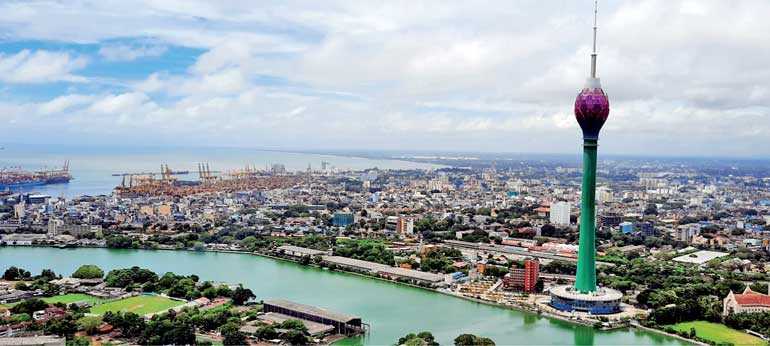Monday Feb 09, 2026
Monday Feb 09, 2026
Friday, 11 December 2020 00:20 - - {{hitsCtrl.values.hits}}

Sri Lanka, following the end of the internal civil war, has been heading towards a catastrophic end through anarchic developments – Pic by Lasantha Kumara
A recent article written by me titled the ‘End of an Era’ received considerable attention in the political arena. One main observation I have made about Sri Lanka following the end of the internal civil war has been that Sri Lanka was heading towards a catastrophic end through anarchic developments. I have
 also written a book titled ‘Lankava Galavaganima’ (Rescuing Sri Lanka) in 2011 explaining the situation.
also written a book titled ‘Lankava Galavaganima’ (Rescuing Sri Lanka) in 2011 explaining the situation.
It can be said that my prediction about Sri Lanka has come true to a considerable degree by now. The object of my previous article on the ‘End of an Era’ was to illustrate that the decline of the socio-political system in Sri Lanka has reached its culmination.
For whatever reason, my article has caught the attention of a number of traditional political leaders. Some of them have discussed it while two others came to Galle and talked to me personally about it. A few days before that another prominent figure in the political arena met me at my residence and had a comprehensive discussion with me about it.
My comments were very critical even of them; and after listening to my criticisms, they all finally reached a conclusion that if there is an alternative approach to overcome this situation and if it could be published in the form of a concept paper , certainly it would be possible to initiate a broader social dialogue on it.
The problem I encounter in this connection is whether the old leaders would be prepared to change themselves and if so, to what extent? I must insist that the proposed changes included in the concept paper produced below have been formulated at their request. Also it is prepared based on an important aspect of the crisis and not the overall crisis the country is facing.
Do the political leaders of the country possess the ability and patience to accept the changes that I wish to propose? If they do, the country will soon be able to adopt appropriate measures for restructuring or else the country will be compelled to languish and suffer in this crisis for a very long time to come.
Proposed changes
01. The Head of State and the Members of Parliament
Disrespecting the Constitution and the fundamental values enshrined therein by the Heads of State and the Members of Parliament elected by the people has undoubtedly led to the rapid decline and deterioration of the socio-political system in Sri Lanka. Under the circumstances, it is necessary that the laws should be enacted making the following offences strong enough to punish them by depriving them of the official positions they hold.
a) Actions leading to violate and distort the Constitution.
b) Actions leading to weaken national unity.
c) The following actions which will lead to distort the nature of the State.
i. Actions that tend to undermine the sovereignty of the people over the State.
ii. Actions that tend to undermine human rights and democratic character of the State.
iii. Actions that lead to weaken the rule of law and fairness of the law.
d) Actions that lead to weaken the security of the State.
e) Actions that can be considered as acts of corruption.
i. Possession of revenue-generating government licenses (radio frequencies, liquor, minerals and other miscellaneous businesses), granting them to family members or close friends.
iii. Acting as government contractors or suppliers.
iii. Purchase, leasing, acquisition and sale and transfer of state property.
02. Probe into serious offenses committed in the field of public property by the Presidents since 1978.
03. Adopt appropriate changes to suit the conditions of Sri Lanka, the system of ‘Popular Initiative’ and the methodology of ‘Alternative Public Referendum’ practiced by some countries including Switzerland which enables the public to bring no-confidence and impeachment motions to Parliament against the rulers who commit serious offences.
04. Assets and Liabilities Act
The Assets and Liabilities Act is a powerful law used in many parts of the world to trap those who have amassed wealth in illegal means. But the Sri Lankan version of it has been designed in such a way that allows offenders to escape. The assets and liabilities law should be amended rectifying its defects and shortcomings and enforced strictly.
a) Laws should be enacted to make deliberate concealment and abstinence from declaring assets and liabilities, a serious offence, and impose a term of two years imprisonment on the offenders and confiscate their wealth not declared.
b) Those that conceal and distort information deliberately should be punished with a term of two years imprisonment.
c) Submission of declaration of assets and liabilities along with nominations should be made mandatory when presenting nominations for elections.
d) The Auditor General should be empowered to maintain a website in respect of the declaration of assets and liabilities of all persons who are legally bound to declare assets and liabilities including the Head of State.
05. Non-democratic political party system
Although there are political parties in Sri Lanka, the lack of a system in which they are operated on a democratic basis can be considered as an important reason that has led to degeneration and collapse of the political system in Sri Lanka
a) It should be made the responsibility of the Elections Commission to ensure that, within a specific time frame, the political parties adopt democratic Constitutions, hold selection of office bearers in accordance with the Constitution, and democratise the structure of the political party system.
06. Election funds
Dependence of the Heads of State, political parties, their leaders and Parliamentarians on black money in elections can be considered an important factor in corrupting the political system. The average expenditure of a leading candidate contesting a Presidential Election is presumed to be around Rs. 3 billion. Often a large portion of this cost is allegedly received from drug traffickers. In return, the incumbent presidents are compelled to favour them secretly so that it will not be visible to the public. The situation of candidates running for parliament is no different.
a) Perhaps, Sri Lanka must be the only country where the political party funds and election funds were not checked. The laws should be enacted to restrict aid received for election funds and election spending and the Election Commission is empowered to monitor them.
b) The authority to inspect party funds and election funds should be vested in the Election Commission and the Auditor General.
c) Laws should be enacted to make it mandatory for all candidates contesting elections to submit their income and expenditure statements to the Election Commission and the National Audit Commission within a specified period following the election, as was the case until 1977. The public should also be empowered to check those records.
07. Electronic media channels
It can be said that the electronic media has contributed to a large extent in creating an irrational and backward milieu in Sri Lankan society. Most of these channels do not operate on a policy framework designed for the common good of the society except for working in an extremely arbitrary manner which is detrimental to the inculcation and promotion of sound social norms. About 95% of these organisations have obtained licenses not in a formal manner. Consequently, the wealth worth billions of rupees that should accrue to the Treasury has allegedly ended up in the pockets of cronies of Presidents.
a) An inquiry must be made to find out as to how electronic media institutions have received their licenses.
b) All electronic media institutions should be subjected to a system of self-regulation that operates within a policy framework designed to ensure that they work for the general welfare of the country.